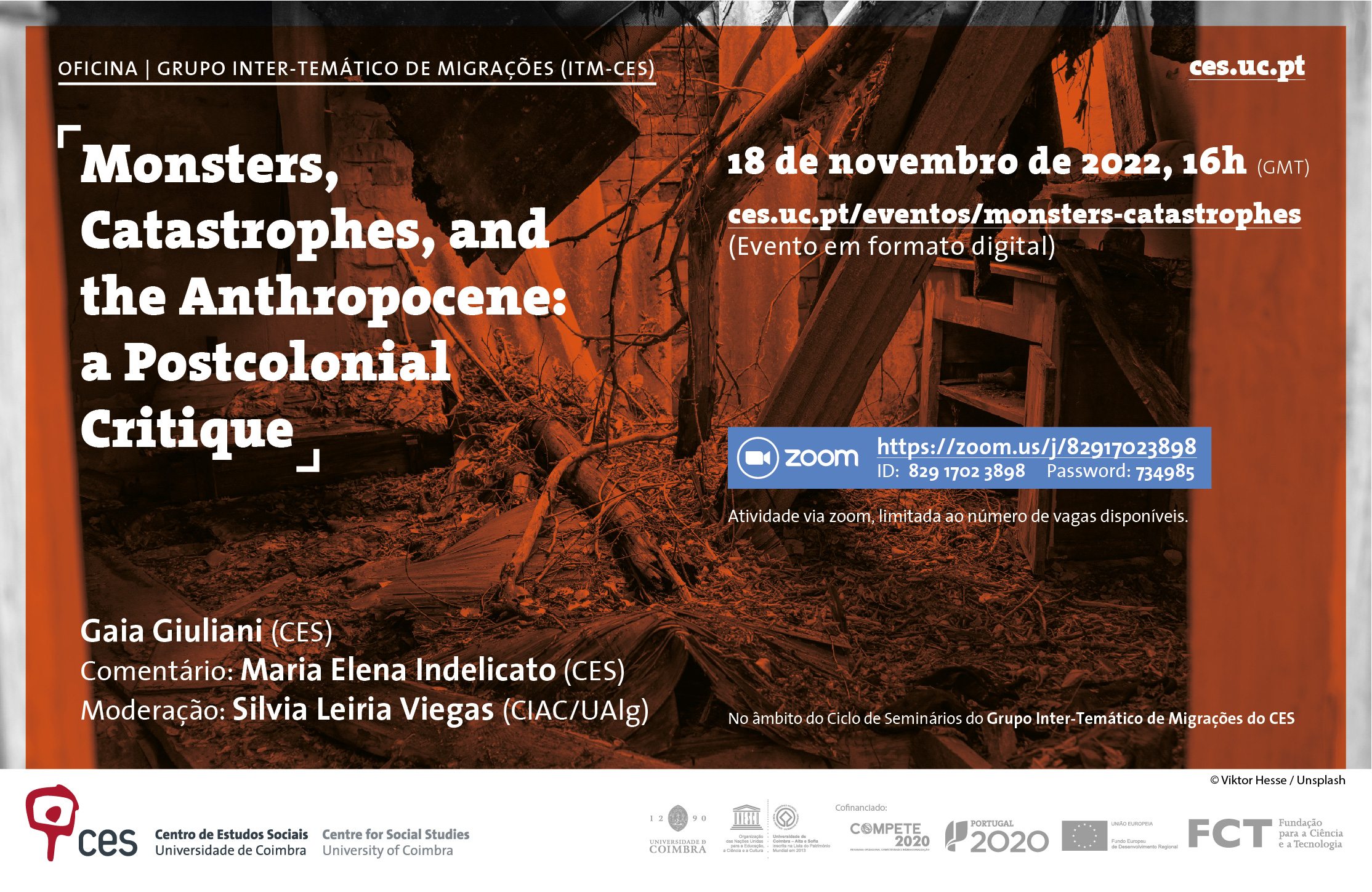ITM - Grupo Inter-Temático sobre Migrações
Oficina | Grupo Inter-Temático de Migrações (ITM-CES)
Monsters, Catastrophes, and the Anthropocene: a Postcolonial Critique
Gaia Giuliani (CES)
18 de novembro de 2022, 16h00 (GMT)
Evento em formato digital
Moderação: Silvia Leiria Viegas (CIAC/UAlg) | Comentário: Maria Elena Indelicato (CES)
Apresentação
This seminar introduces Gaia Giuliani's last book Monsters, Catastrophes and the Anthropocene: A Postcolonial Critique, which explores European and broader Western imaginaries of natural disaster, mass migration and terrorism through a postcolonial inquiry into modern conceptions of monstrosity and catastrophe. This book examines established icons of popular visual culture in sci-fi, doomsday and horror films and TV series, as well as in images reproduced by the news media to trace the genealogy of modern fears as well as of ontologies and logics of the Anthropocene. By logics of the Anthropocene, the book refers to a set of principles based on ontologies of exploitation, extermination and natural resource exhaustion processes that determine who is worthy of benefiting from value extraction and being saved from catastrophes and who is expendable. Fears for the loss of isolation from the unworthy and the expendable are investigated here as originating anxieties against migrants’ invasions, terrorist attacks and planetary catastrophes, in a thread that weaves together re-emerging ‘past nightmares’ and future visions.
Nota biográfica
Gaia Giuliani is an Italian Critical whiteness studies pioneer and an anti-racist feminist activist and scholar. She is a political philosopher and a permanent researcher at the Centre for Social Studies (CES), University of Coimbra. She hold her PhD at the University of Torino (2005) and since then has worked at the Universities of Bologna, UTS (University of Technology Sydney, and Cambridge, and collaborated as research associate with the University of Padua, Bologna, Leeds, London (Goldsmiths and Birkbeck College), Fordham and Ca' Foscari (Venice). Her research work aims to deconstruct post-colonial (visual) archives of monstrosity through the analysis of texts coding 'fears of disasters and crisis' and their symbolic and material impact on European and Western self-representations in the context of the post-9/11 terrorist threat, the so-called migrant and refugee crises, and environmental catastrophes including the Covid-19 pandemic. Among her books, she is the author of Monsters, Catastrophes and the Anthropocene. A postcolonial Critique (Routledge 2021), Race, Nation, and Gender in Modern Italy. Intersectional Representations in Visual Culture (Palgrave Macmillan 2019) - Finalist, Fifth place ex-aequo of the Edinburgh Gadda Prize 2019, Zombie, alieni e mutanti. Le paure dall’11 settembre ai giorni nostri (Le Monnier-Mondadori Education 2016), Bianco e nero. Storia dell’identità razziale degli italiani with dr. Cristina Lombardi-Diop (Le Monnier-Mondadori Education 2013) - First prize in the 20th-21st century category by the American Association for Italian Studies, and Beyond curiosity (Aracne 2008). On her topics, she teaches and gives lectures and seminars in many universities (e.g. in Portugal, the UK, Italy, France, Germany, Denmark, Sweden, Norway, Brazil, the US, Australia, Canada and India).
___________________________
Esta atividade realiza-se através da plataforma Zoom, sem inscrição obrigatória. No entanto, está limitada ao número de vagas disponíveis > https://us02web.zoom.us/j/82917023898 | ID: 829 1702 3898 | Senha: 734985
Agradecemos que todas/os as/os participantes mantenham o microfone silenciado até ao momento do debate. A/O anfitriã/ão da sessão reserva-se o direito de expulsão da/o participante que não respeite as normas da sala.
As atividades abertas dinamizadas em formato digital, como esta, não conferem declaração de participação uma vez que tal documento apenas será facultado em eventos que prevejam registo prévio e acesso controlado.


